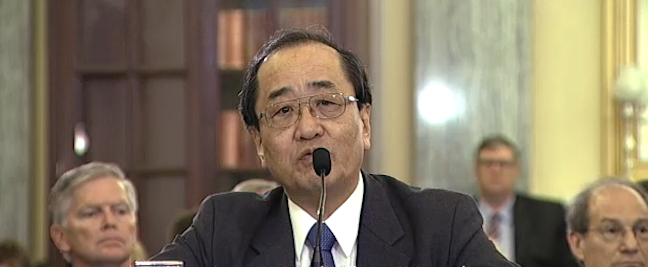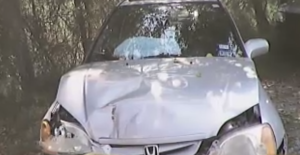Takata “Deeply Sorry” To Those Affected By Defective Airbags, Still Reluctant On Nationwide Recall

Hiroshi Shimizu, enior Vice President, Global Quality Assurance Takata Corporation, answered questions during a Senate committee hearing regarding defective airbags.
Erdman opened the hearing by urging Takata, car manufacturers and the National Highway Traffic Safety Administration to take the necessary steps to prevent future accidents involving the defective airbags.

When Stephanie Erdman’s 2002 Honda Civic was invovled in an accident, shrapnel from her Takata airbag caused her significant injuries.
“I know I have physical scars from this tragedy, but my family does too, you just can’t see them,” she said. “I believed it is necessary to tap the attention of those who have the ability to do something.”
The crux of Thursday’s hearing dealt with Takata and car manufacturer’s lack of immediate action after learning of a possible defect with the safety devices, and their apparent unsatisfactory notification practices meant to alert consumers of potential dangers in their vehicles.
Erdman told the Committee that Honda reportedly told all certified dealers to examine vehicles brought in for service to see if they contained the airbag defect. She says she brought her vehicle to the Honda dealer where it was purchased, but was never warned of what could happen if her airbag ruptured.
Additionally, she says the manufacturer attempted to send her a letter regarding the recall in 2010, but it was returned to the company as undeliverable. No further notification attempts were conducted.
Rick Schostek, executive vice president of Honda North America, apologized to Erdman, saying the company failed her.
While Erdman’s testimony provided a clear example of the severity of the airbag defects, the bulk of the hearing’s questions went to Takata senior executive Hiroshi Shimizu.
Shimizu’s appearance at the hearing is the first time that Takata has answered questions posed by members of Congress related to the defects.
“We are deeply sorry,” Shimizu says about the consumers who were injured or killed as a result of the defective devices. “Any failure of an airbag to perform as designed in an automobile accident is incompatible with Takata’s standards of high assurance.”
The company is currently devoting “extraordinary resources” to produce quality and secure replacements to fulfill automakers demands, Shimizu says.
When asked by senators if the company would heed NHTSA’s urging earlier this week to implement a national recall of vehicles containing Takata airbags, Shimizu says tests have not revealed the airbags’ inflator ruptures outside high-humidity areas.
Currently, most recalls of affected vehicles have been limited to Florida, Hawaii, areas along the Gulf Coast, as well as Puerto Rico and some other U.S. territories.
“Our best current information supports that these regions must be the priority for the replacements,” he testified.
Schostek, the Honda executive, and Scott Kunselman, senior vice president of vehicle safety and regulatory compliance for Chrysler, were both reluctant to voice their company’s support for an expanded national recall.
“As to a national recall, we have not refused, we are actively considering it,” Schostek says.
Senators Richard Blumenthal of Connecticut and Ed Markey of Massachusetts, both members of the Committee, pressured the auto executives to answer questions about the slow-pace related to replacing defective airbags and the failure to expand the scope of the recall.
“It strikes me that these airbags failed, but the system failed equally if not more,” Blumenthal says. “I want to join Sen. Markey in his calling for a national recall of all cars with these airbags in passenger and driver’s side. I am also calling on Secretary of Transportation to immediately accelerate the replacement process going forward.”
Shimizu says the parts manufacturer understands that they need to speed up the production of replacement parts.
“We are discussion with automakers any other options we can take to speed up replacement,” he says.
Blumenthal estimated that at the current rate of production – about 300,000 airbags per month – there was no way Takata could produce enough airbags to provide swift fixes for the nearly 8 million cars recalled regionally in the United States.
As for the automakers, Schostek with Honda contends that the company has enough replacement parts on hand to fix its recalled cars. The statement is a drastic change from reports last month that the automaker didn’t have enough parts to fix 2.8 million vehicles that had been recalled by mid-October.
Senators also pressured the auto executives to provide loan vehicles for consumers who are waiting to have their vehicles repaired. Both Schostek and Kunselman say their companies provide such a service.
However, hearing chairman Senator Bill Nelson of Florida says he had heard from consumers that this wasn’t provided.
“The first thing that needs to be done, is to take care of consumers,” Nelson commented. “Auto makers need to get a replacement part so airbags can be replaced…people are driving around with defective airbag in their steering wheel and dashboard.”
Want more consumer news? Visit our parent organization, Consumer Reports, for the latest on scams, recalls, and other consumer issues.

